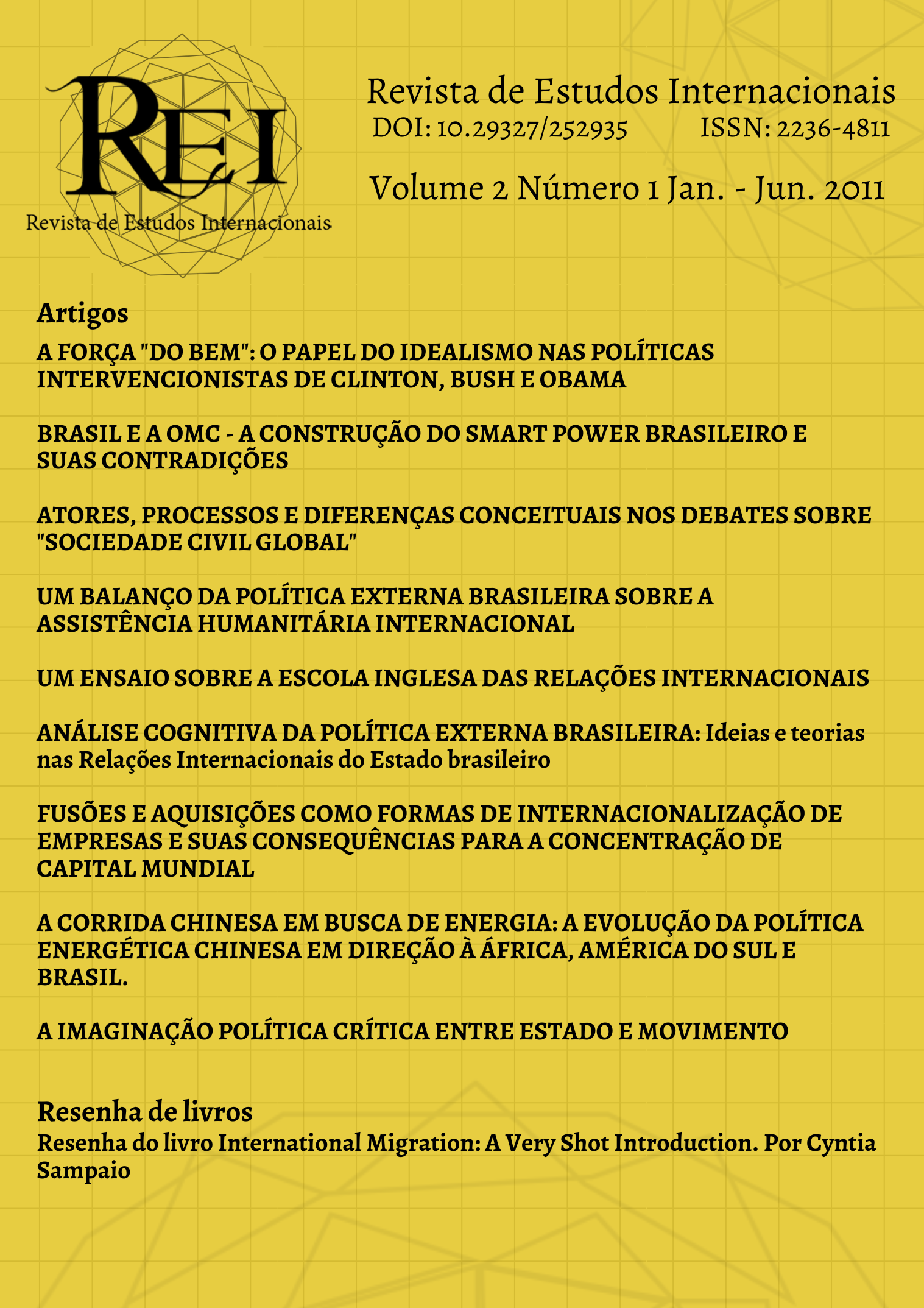ATORES, PROCESSOS E DIFERENÇAS CONCEITUAIS NOS DEBATES SOBRE “SOCIEDADE CIVIL GLOBAL”
Palavras-chave:
sociedade civil global, atores não-estatais, transnacionalismo, GlobalizaçãoResumo
O artigo aponta que a discussão sobre a emergência de uma “sociedade civil global” – dominada pelas perspectivas liberais na década de 1990 - se diversificou na última década e, em certa medida, refletiu o retrocesso das expectativas em torno dos processos de globalização e mecanismos de governança. Ao longo do texto, apresentam-se as definições que estabeleceram os termos do debate no pós-Guerra Fria e apontam-se algumas problematizações que surgiram a partir de vertentes teóricas mais críticas (a legitimidade e o poder dos atores da sociedade civil e o potencial de emancipação e/ou dominação contidos nestas arenas de articulação transnacional). Propõe-se que a ideia de uma “sociedade civil global” pode ser mais bem entendida a partir da distinção de duas grandes dimensões de atuação política não-estatal além das fronteiras nacionais, com interesses e estratégias diversas (hegemônicos/top-down e contra-hegemônicos/bottom-up), que podem se complementar ou se contrapor.
Referências
BARTELSON, Jens. (2006) Making sense of Global Civil Society. European Journal of
International Relations, 12 (3): 371-395.
BERRON, Gonzalo (2007). Identidades e estratégias sociais na arena transnacional. O caso do movimento social contra o livre comércio nas Américas. Tese de doutorado, Departamento de Ciência Política, Universidade de São Paulo.
BORRAS Jr, Saturnino (2008). “La Via Campesina and its Global Campaign for Agrarian Reform”. In: Borras, Edelman e Kay. Transnational agrarian movements: origins and politics, campaigns and impacts. Wiley-Blackell.
BRASSETT, James. (2009) A pragmatic approach to the Tobin Tax Campaign: the politics of sentimental education. European Journal of International Relations, 15 (3): 447-476.
CHASE-DUNN, Christopher e GILLS, Bary. (2005) Waves of globalization and resistance in the capitalist world-system: social movements and critical global studies. In: Appelbaum, Richard e Robinson, William. Critical Globalization Studies. Oxon/NY: Routledge.
COHEN, Jean L. (2003) Sociedade Civil e Globalização: repensando categorias. Dados – revista de Ciências Sociais, 46 (3): 419-459.
COLAS, Alejandro (2002). International Civil Society: Social Movements in World Politics. Oxford: Polity.
COSTA, Sergio. (2002) As cores de Ercília. Belo Horizonte: UFMG.
_____________. (2003) Democracia cosmopolita: déficits conceituais e equívocos políticos. Revista Brasileira de Ciências Sociais, 18 (53).
COX, Robert. (1999) Civil society at the turn of the millennium: prospects for an alternative world order. Review of International Studies 25, pp. 3-28.
DELLA PORTA, Donatella. (2007) The Global Justice Movement: Cross-National and Transnational perspectives. Paradigm Publishers.
EVANGELISTA, Ana Carolina Pires. (2006) Perspectivas sobre a “sociedade civil global” no estudo das Relações Internacionais. Dissertação de Mestrado Programa de Pós Graduação San Tiago Dantas (PUC-SP, UNESP e UNICAMP), São Paulo.
FOUCAULT, Michel. (2003) Society must be defended – lectures at the Collège de France 1975-1976. New York: Picador.
_________________. (1979) Microfísica do poder. Rio de Janeiro: Edições Graal. GERMAIN, Randall e KENNY, Michael. (2005) The idea of global civil society – politics
and ethics in a globalizing era. Oxford/New York: Routledge.
GILL, Stephen. (2000) Toward a Postmodern Prince? The battle in Seattle as a moment in the
new politics of globalisation. Millennium: Journal of International Relations, 29 (1).
HEATHERSHAW, John. (2008) Unpacking the Liberal Peace: The Dividing and Merging of
Peacebuilding Discourses. Millennium - Journal of International Studies, 36 (3): 597-621.
HURRELL, Andrew. (2005) Power, institutions and the production of inequalities. In: Barnett, M. and Duvall, R. (orgs.) Power in Global Governance. Cambridge: Cambridge University Press.
JAEGER, Hans-Martin. (2007) ‘Global Civil Society’ and the Political Depoliticization of Global Governance. International Political Sociology, 1 (3): 257–77.
KALDOR, Mary. (2000) “Civilising' Globalisation? The Implications of the 'Battle in Seattle”. Millennium: Journal of International Relations, 29 (1).
_______________. (2003)The idea of global civil society. International Affairs 79 (3): 583- 93.
KEANE, John. (2003) Global Civil Society? Cambridge: Polity.
KECK, Margaret e SIKKINK, Kathryn. (1998) Activists beyond borders. New York:
Cornell University Press.
KEOHANE, Robert e NYE, Joseph. (1971) Transnational relations and world politics. Harvard University Press.
NOGUEIRA, Marco Aurelio. (2004) Um Estado para a sociedade civil. São Paulo: editora Cortez.
SANTOS, Boaventura de Sousa. (2005) Os processos da globalização. In: Santos, B.S. (org.) A Globalização e as Ciências Sociais. São Paulo: Cortez.
SCHOLTE, Jan Aart. (2000) “Cautionary Reflections on Seattle”. Millenium: Journal of International Studies, 29 (1): 115-21.
________________. (2002) Civil Society and Democracy in Global Governance. Global Governance 8: 281-304.
VILLA, Rafael D. e TOSTES, Ana Paula B. (2006) Democracia cosmopolita versus política internacional. Lua Nova, 66: 69-107.
WALKER, R.B.J. (1993) Inside/outside: international relations as political theory. NY: Cambridge university press.
______________ (2006) The double outside of the modern international. Ephemera – theory & politics in organization 6 (1): 56-69.


